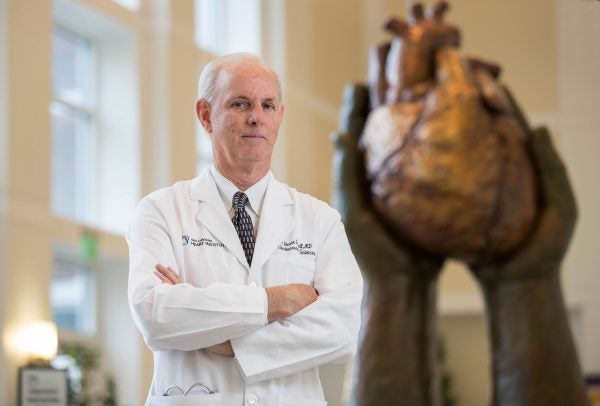ECU vascular surgeon recognized for teaching atherosclerosis prevention
An East Carolina University vascular surgeon has earned national recognition for his innovation in teaching medical students about atherosclerosis – the narrowing and hardening of the arteries due to plaque buildup – a disease with serious health complications.
Dr. Steven Powell, chief of vascular surgery at the Brody School of Medicine at ECU, won the award for “Best Faculty Poster” at the national meeting of the Association for Prevention Teaching and Research in Philadelphia on April 9. The poster, coauthored by ECU vascular surgery fellow Dr. Heidi Hansen, outlined the results of a focused lecture series that Powell developed for third-year medical students called theAtherosclerotic Peripheral Arterial Disease (APAD) Academy.
Launched in the fall of 2017, the course is required for all third-year medical students at ECU during their one-week rotation on the vascular surgery service.
“Atherosclerosis in the heart and peripheral arteries is highly prevalent in eastern North Carolina,” said Powell. His emphasis is on teaching about atherosclerosis in the peripheral arteries because it is not as well-known as atherosclerosis in the heart arteries.
“Expanding this educational course to more medical schools would help in teaching future physicians about atherosclerotic disease in the peripheral arteries,” he said.
Atherosclerosis can be widespread throughout the body and without proper treatment it can progress and lead to heart attack, stroke, kidney failure and limb loss. According to the American Heart Association, atherosclerosis may start in childhood. In some people, it progresses rapidly in their 30s, while in others, it doesn’t become dangerous until they reach their 50s or 60s. Smoking contributes to the progression of the disease.
“The goal is to get a focused message about atherosclerosis to our medical students because they will become the next generation of providers,” Powell said. “The key is education, to let patients know that the first thing you have to do is treat risk factors and also abandon any unhealthy lifestyle habits such as smoking, poor diet and lack of regular exercise.”
Powell has personal experience in taking action to avoid adverse health consequences. He adopted a more active, nutrition-conscious lifestyle several years ago after being told by his own physician that he was pre-diabetic. These lifestyle changes led his pre-diabetic state to completely revert back to normal.
He said adding a concentrated course on atherosclerosis to medical school curricula could help stave off the disease in more patients and help those with it get the right medications and education earlier. Medication combined with appropriate lifestyle changes can dramatically lessen a patient’s risk of serious health consequences, he said.
“The importance of Dr. Powell’s patient centered research and education cannot be overemphasized, especially as it relates to our specific patient population in eastern North Carolina,” said Dr. Mark Iannettoni, ECU chair of cardiovascular sciences.
“Unfortunately, our region has a higher proportion of diabetes, hypertension and cardiovascular disease than anywhere in the state,” Iannettoni continued. “Dr. Powell is sending the message that intervention with a procedure is not the answer; however, intervention with prevention is the right thing to do. We need to adopt this ideology with many disease processes so that we can take better care of people before they need an intervention.”
Powell hopes his APAD Academy will lead to better recognition and treatment of the disease across the region and beyond. He plans to make the lecture series available online through Eastern Area Health Education Center (AHEC) to practicing physicians who can gain CME credit for viewing it.
“National studies show that atherosclerotic peripheral artery patients are not routinely receiving the risk factor treatment and lifestyle change information that make a difference in their health,” Powell said. “By raising awareness, I hope to have earlier recognition of the disease so that treatment can be instituted early. This could save health care dollars by avoiding many of the expensive interventions that are required in the latter stages of the disease.”
###
ECU News Services
Howard House, 1001 E. Fifth Street
Greenville, NC 27858
ecunews@ecu.edu
Phone: 252-328-6481
news.ecu.edu
Contact: Spaine Stephens, Health Sciences Communications, stephenss@ecu.edu
Telephone: (252) 744-3808
